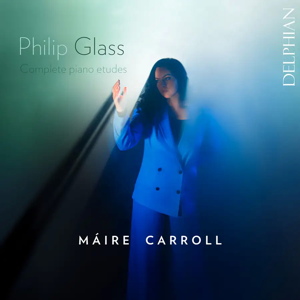
Philip Glass (b. 1937)
Complete Etudes for piano (1994-2012)
Máire Carroll (piano)
rec. 2023, St. Peter’s Church, Drogheda, Ireland
Delphian DCD34330 [2 CDs: 125]
I have tended to be rather suspicious of Philip Glass: he seems to me to write too much, and it is all rather too similar. The minimalist idiom, though powerful in its way, is also limited, and one can weary of the ostinatos, arpeggios and characteristic harmonic sequences. Still, he has achieved some great successes with this idiom; I think particularly of Music in Twelve Parts and the opera Akhnaten.
However, this year I have had to revise my thinking as I have discovered, rather late in the day, his piano etudes. (He does not spell them the French way, so no acute accent.) I recently greatly enjoyed a selection of them, played by Feico Deutekom (review) and so I was pleased to receive this recording of the complete set. The etudes are longer than those by, say, Chopin or Debussy, so the complete set of twenty runs to two discs, and the longest etude, No 5, runs for nearly ten minutes. He wrote them over a number of years, initially, in the first Book of ten, for himself to play, and then, in the second Book, for others. Consequently, as the set goes on, they tend to become increasingly ambitious technically and also more expressive emotionally, rather as do the pieces in Bartók’s Mikrokosmos, also written as a progressive set of studies. They are nearly contemporary with Ligeti’s set, and although I would not quite consider them the equal of those, they are very worthwhile works and have, indeed, been taken up by a number of players.
They do, indeed, use the characteristic minimalist devices I noted above, but Glass has a real feeling for piano sonority and explores a great range of figuration and technical devices to give variety. No 1 sets the scene with four firm chords, followed by an ostinato pattern to which is added a melody, which itself moves between the hands. There is then a quiet coda, which some of the etudes have, while others stop abruptly. No 2 is a gentle piece while No 3 is extravert and jolly. No 4 is quiet, obsessive and intense. No 5, which I noted as the longest of the whole set, is also quiet. No 6 features fast repeated notes, while No 7 is mellifluous and more obviously expressive. The expressive weight increases in the last three etudes of the first Book, though No 10 is one of those which ends abruptly.
No 11, the first etude of the second Book, immediately announces itself as more challenging, with different layers playing simultaneously, sudden changes in mood and texture and plunges into the deep bass. No 12 takes off from Bach’s first Prelude but turns into a whirling toccata. In No 13 the ostinato patterns are cut across by irregular interjections. No 14 is gentle. No 15 is joyous with a lilt in the rhythm. No 16, in contrast, is mysterious and brooding with a piquant theme in single notes. No 17 is sinister and dramatic. No 18 is almost Chopinesque, while No 19 has a rich texture and is almost a tone poem for piano. No 20 ends the work with a playful and capricious piece.
Máire Carroll is an Irish pianist who decided to learn the Glass etudes during the lockdown due to Covid-19. She has also made a study of recent piano etudes. She has an immaculate technique: you would not know, for example, when a repeating figure moves between hands, and she is fully responsive to the expressive qualities which increasingly dominate the later etudes. Her performances bring out all the playfulness, the expressive qualities and the latent seriousness of these etudes. The sound is excellent.
The etudes have been taken up by a number of pianists, and there are both complete and selected recordings. The standard reference is the set by Maki Namekawa, but our reviewer, Kirk McElhearn, had reservations about the recording (review). I haven’t heard that, but have been well satisfied with Máire Carroll and continue to be intrigued and fascinated by these pieces.
Stephen Barber
Buying this recording via a link below generates revenue for MWI and helps us keep free access to the site



















